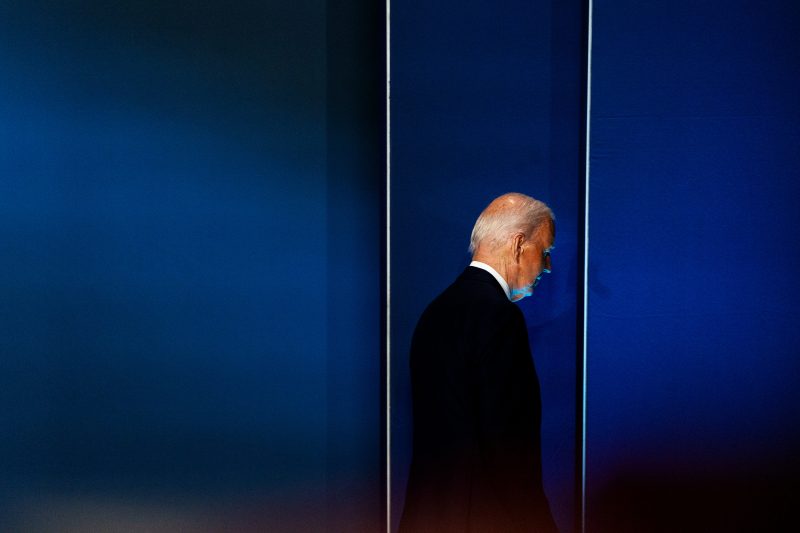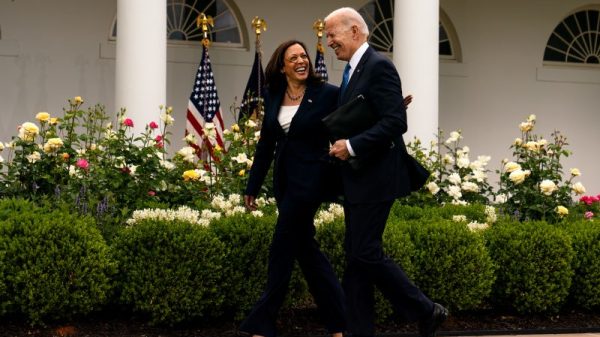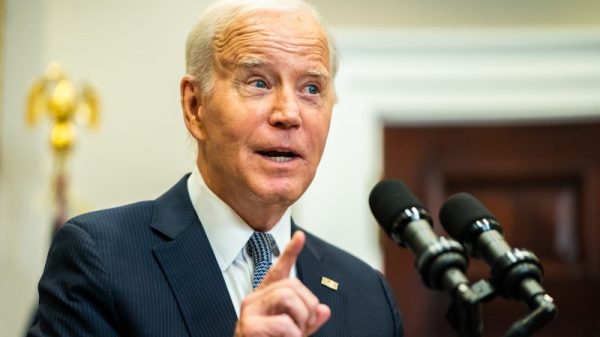
President Biden’s decision to end his reelection campaign following 25 days of agonizing pressure from his own party may seem like yet another moment of chaos in an American democracy already buckling under historic levels of polarization and torrents of misinformation.
But to many historians, Biden’s announcement and the unprecedented scramble that began on Sunday to choose a new Democratic Party nominee stood out as something different. The momentous events of the weekend revealed that America’s beleaguered system of government still functioned.
“We should recognize that unexpected successions are a part of what all democracies have to live through,” said Daniel Rodgers, who taught American history at Princeton for much of his career.
Over nearly 250 years, American presidencies have ended prematurely a handful of times — including four by assassination and, in the case of Richard M. Nixon, by scandal. In 1968, President Lyndon B. Johnson, burdened by the disastrous war in Vietnam, shocked the country when he announced that he would not pursue or accept the Democratic Party’s nomination.
Biden succumbed to something far more prosaic: the ravages of age and, after a meandering debate performance on June 27, growing doubts among both the party elite and its base that he could defeat former president Donald Trump or effectively lead the country in a second term. In the three weeks that followed the debate, the party’s leaders mounted a relentless campaign that eventually persuaded Biden that his stepping aside was in the best interests of the country.
To Rodgers, Biden’s decision under pressure was historic and a sign of democracy working as intended. “We ought to take this as relatively normal,” he said.
Others echoed that sentiment. “Parties exist to do this kind of thing,” said Eliot Cohen, a historian and political scientist who recently retired from Johns Hopkins School of Advanced International Studies. “This is not chaos.”
In forcing Biden to concede he was no longer capable of mounting an effective campaign, the party’s leaders sent a message that America’s system of government is bigger than any single leader. For weeks, as he fought to hold on, Biden repeatedly insisted that his first-term accomplishments proved he was uniquely qualified to lead the country.
“Name me a foreign leader who thinks I’m not the most effective leader in the world on foreign policy. Tell me. Tell me who … that is,” Biden snapped on a recent call with Rep. Jason Crow (D-Colo.). His tone often mirrored that of Trump, who has boasted that he “alone” could “fix” the country.
On Sunday, in a letter announcing his decision, Biden listed his successes — but he also acknowledged that they weren’t attributable to him “alone,” pointedly striking a note about the system of government he had been pledging as a candidate and president to defend. “I know that none of this could have been done without you, the American people,” he wrote.
Even as historians hailed Biden’s decision to step aside as an example of democracy working, there was broad agreement that the president, who had promised to return America to an era of normalcy, was leaving behind a system of government that remains under tremendous strain.
Confidence in core American institutions — the Supreme Court, the military, the criminal justice system, Congress — are at near-record lows for the last 50 years, according to polls. Large numbers of Republicans and Democrats see the election not just as a contest for the White House but as an existential struggle to save the country from destruction at the hands of the opposing party.
For the first time in more than 50 years, the Democratic Party’s nominee will not be chosen by voters in an open primary, but in a process that’s still to be determined. The party’s elite seem to be coalescing rapidly behind Vice President Harris as the candidate best positioned to challenge Trump, and most of the delegates pledged to vote for Biden at next month’s convention have now pledged to vote for her.
The most obvious historical parallel to the current moment dates to March 1968 when Johnson, driven by anger over the war in Vietnam, his declining health and likely challenges from fellow Democrats, opted not to seek a second term. Johnson made his decision just as the primary was set to start. A few months later in Chicago, establishment Democrats selected Vice President Hubert Humphrey to be their nominee over Sen. Eugene McCarthy, an antiwar candidate with broader grass-roots appeal.
But the two periods are also marked by stark differences.
Tremendous chaos in the late 1960s — mass protests, riots and the assassinations of Martin Luther King Jr. and Robert F. Kennedy — shook the foundations of American democracy. “People were talking about revolution around the corner,” said Rodgers, the Princeton historian.
Rodgers described the current moment as animated more by resignation and cynicism — “a withdrawal of confidence in the possibilities of democracy” reminiscent of the 1970s, when hyperinflation, crumbling infrastructure and rising crime rates seemed to overwhelm the country’s leaders and its system of government. Such a moment, Rodgers said, still posed grave dangers for American democracy. He warned that it was particularly well suited to a candidate who projects “strength, authority and a kind of dictatorial certainty that democracy doesn’t seem to be able to provide.” In other words, a candidate like Trump.
Other historians took an even darker view, seeing similarities to the late 1850s, when the question of slavery was tearing the nation apart. “This was a moment in which the country just couldn’t find ways to compromise anymore,” said Nell Irvin Painter, another Princeton historian and author of “The History of White People.” “And as we know,” she said, “it broke out into an armed conflict.”
Painter discounted the possibility of armed conflict breaking out again. The clear geographical divisions that led to secession and civil war do not exist today. But she described a country similarly engaged in a struggle over two incompatible visions for American democracy.
Democratic leaders, including both Biden and former president Barack Obama, have described America primarily as a set of beliefs and principles. In a 2022 speech at Independence Hall in Philadelphia, Biden cast the country as “an idea — the most powerful idea in the history of the world.” It’s a vision of the country as ever changing, “a constant work in progress,” in the words of Obama, forever seeking to realize the high ideals in its founding documents.
In his speech last week at the Republican National Convention, Sen. J.D. Vance of Ohio, Trump’s newly announced running mate, rejected the Democrats’ formulation in favor of a more fixed, geographically defined vision of the country and its democracy. “America is not just an idea,” he said. “It is a group of people with a shared history and a common future. It is, in short, a nation.”
In Trump and Vance’s vision, the biggest threats to American democracy largely come from within in the form of Democrats who have “weaponized” the justice system to punish their enemies, and undocumented immigrants. “They’re coming from prisons. They’re coming from jails. They’re coming from mental institutions and insane asylums,” Trump warned last week in accepting the Republican nomination.
In such a divided nation, there seems to be a consensus among voters from both parties that American representative democracy isn’t working especially well.
In six swing states that Biden narrowly won in 2020, a majority of likely voters said that threats to American democracy were extremely important to them, according to a recent poll by The Washington Post and the Schar School of Policy and Government at George Mason University. But they didn’t clearly see either Biden or Trump as uniquely able to defend the country from these anti-democratic threats.
To Aziz Rana, a constitutional historian at Boston College Law School, the broad disillusionment with American democracy is a product of a system that regularly produces outcomes that are out of step with the public’s desires.
The trend is most apparent on key issues such as abortion rights and gun safety. In an era marked by repeated school shootings, lawmakers have done little to curb access to firearms. On the abortion issue, voters in red and purple states, such as Kansas, Kentucky, Montana, Michigan and Ohio, have by sizable margins either rejected new limits on abortion or backed measures guaranteeing greater access. But there’s little chance that reproductive rights will be restored at the national level anytime soon, despite the popular will.
Rana described the disconnect as reminiscent of the 1912 election, when a similar disillusionment produced an election in which candidates from four parties — Democratic, Progressive, Republican and Socialist — competed for the presidency. The aftermath of that election, won by Woodrow Wilson, led to two constitutional amendments that forever altered American democracy. The 17th Amendment enshrined the popular vote of U.S. senators. The 19th Amendment guaranteed women the right to vote.
Today, constitutional amendments are near impossibilities.
Historians characterized Biden’s decision to step down as significant and shocking, but not out of step with how American democracy was intended to function. Instead, they described Trump and the movement he leads as the bigger outlier.
For much of its history the country’s major political parties have espoused a shared belief in an “inspiring ideal,” even as they disagreed on how to get there, said Abram Van Engen, a historian at Washington University in St. Louis.
To Van Engen, Trump marks a sharp departure from that tradition. The former president’s vision of American greatness is defined not by soaring ideals, but rather by the country’s military might, economic power and ability to impose its will on its adversaries. “He doesn’t seem to have any understanding of American history or our narrative journey,” Van Engen said.





























